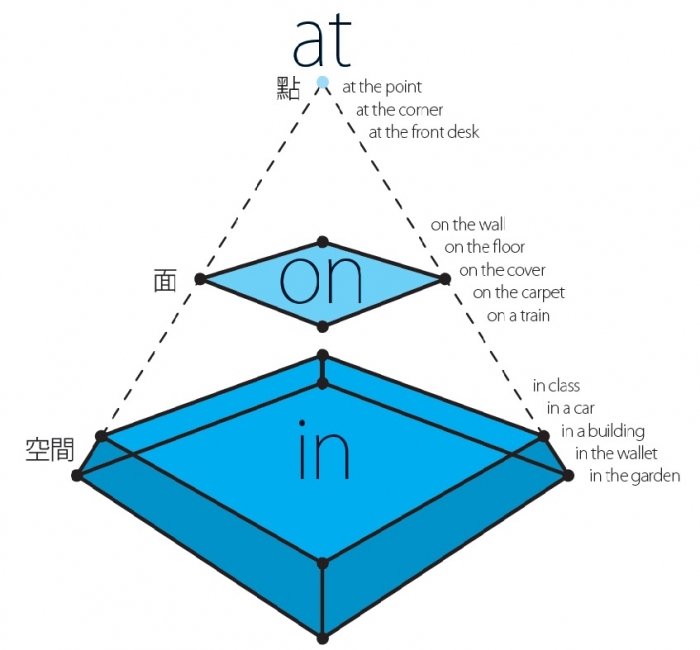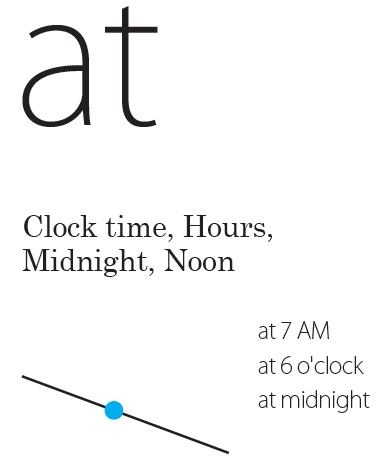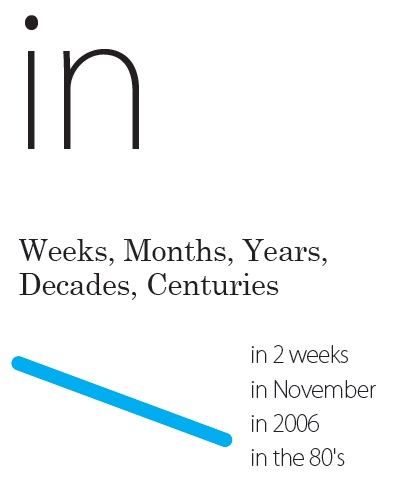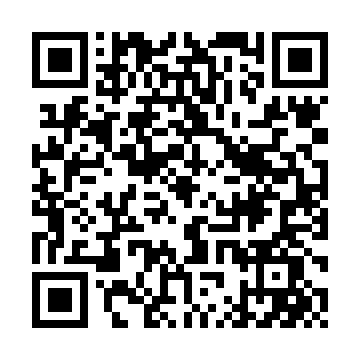
介係詞決定你英文的敏銳度
文/英語島編輯室
01 你到底「在」哪裡 At是一個點。假如你說某個人「at某個地方」,你一定找得到他,因為他就在那一點上。坐在桌子前,叫做sit at the table;和你約在某咖啡廳碰面,是meet you at the coffee shop;當然在某一個門牌號碼前面,看著某人,很自然地也都是用at。
At是一個點。假如你說某個人「at某個地方」,你一定找得到他,因為他就在那一點上。坐在桌子前,叫做sit at the table;和你約在某咖啡廳碰面,是meet you at the coffee shop;當然在某一個門牌號碼前面,看著某人,很自然地也都是用at。
On是一個面。我住在二樓,用I live on the second floor;在某條街上,想像站在那裡、抬頭挺胸,是一種平面概念,用on the street;在火車、捷運的車箱上,你不是擠在一個空間裡,可以伸直腰,站在平面上,這是on。那在飛機上呢?
想想這個規則,on an airplane。
In是一個空間。空間可以大到是宇宙、山川、國家、城市,也可以小到一個車子、杯子、眼睛,所以是in the mountains、in the river、in Taiwan、in Taipei、in a car……。
好,問題來了,有學生問,在辦公室是in還是at?in和at都對,意思有些微差別:
I'll meet you at the office.
(我們在辦公室見。)指地點。
I'm in my office.
(我正在工作。)
In不只是在辦公室,而是做著在那個空間裡應該發生的事;好比in school是求學,in class是上課,in the office是辦公。
有時候in和at用錯了會讓人會錯意。我們經常講的一句話,「請打電話到我辦公室給我」。這句話要怎麼說呢?in還是at?
Please call me ___ the office.
(請打電話到我辦公室給我。)
Please call me at the office是正確的;當然也有比較直接的說法Please call my office,不要說please call me in the office,既像「你在辦公室打給我」或「打電話到我的辦公室」,又像「請你在辦公室叫我一聲」(兩人可能在同一個辦公室)。call也有「呼叫、喊叫」的意思。
02 at < on < in介係詞的時間感
At表示特定的時間點。想像時間是一條線,at就是線上的某個時間點,強調事情發生的那一刻,例如:
I got up at 7:00 this morning. (我今天早上7點起床。)
The miracle happened at that moment. (奇蹟在那一刻發生了。)
另外,表示一天中的某個時刻,不需加冠詞,如at dawn、at midnight、at night。

On表示特定的日子或日期。像是:
Let's have dinner on Friday. (我們禮拜五一起吃晚餐吧。)
His birthday is on the fourth of August. (他的生日在8月4日)
We are going to the party on Halloween. (萬聖節當天我們會去參加派對。)
那為什麼會有at Halloween呢?on Halloween是指萬聖節當天,而at Halloween則是指在萬聖節的期間。

In表示特定較長的時間。如月份、年份、季節、時代、世紀,或一段時間。例如:
My uncle is going to retire in 2015. (我舅舅2015就要退休了。)
She started the job in August. (她在8月的時候就開始做這工作了。)
用in表示一段時間,如in my lifetime(在我的人生中);或是I will go to England in 2 weeks. (在2個禮拜內我就要去英國了。)
但in the night和at night又有什麼不同?in the night指的是夜間,從日落到日出這個時段,at night則是指晚上,一天的某個時間點。
03 培養對介係詞的感覺
為什麼房間的門用the door of the room,門的鑰匙卻是the key to the door?究竟有沒有個道理可循?
道理在「感覺」,不在「文法」。每一種語言都有一種自然演進的規律,這種規律,與其記規則,不如感受它;比方說,在車上,如果是汽車是in a car,公車是on a bus;記住這種感覺,如果你在交通工具裡要彎腰,就用in,in是包在裡頭的感覺,如果是挺著身體走得進去,就是on。依此類推,在飛機上是in還是on?自然是on an airplane了。
現在一起來看看幾個介係詞給人的感覺:
(1) to/for
To是「朝著目標去」的感覺,目標明確,一定會到);for是「朝著一個方向去」的感覺,是一個大方向,並沒有說一定會到。例如:Give the proposal to me. (將那計劃書交給我。)「給(give)」這個動作必須要作用在"me"身上才算完成,所以用to。
I'll buy it for you. (我會幫你買。) for指一個方向,不管有沒有交給you,「買(buy)」的動作都已經完成,所以用for。
(2) with/by
With是「伴隨著/在旁邊」的感覺,by則是「靠…過去」的感覺。例如:
I will go with May. (我會和May一起去。)
因為with給人的感覺是「伴隨著」,也就是「在旁邊/拿在在手上」的意思,所以with可以解釋作「利用…工具」,像是
I opened the door with a key. (我「用」一把鑰匙開那扇門。) 或者
I am satisfied with the gift. (我很滿意那個禮物。) 有這個gift,滿足感隨之而來。
I went there by train. (我搭火車到那裡。)
「靠…過去」是透過train這種交通工具抵達,不能用I went there "with" train,這樣會變成「使用(手拿著)」train到那兒。
(3) of
是從屬、包含、分離的概念。例如:
The table is made of glass. (桌子是由玻璃製成。)桌子是從玻璃中「分離出來的」。
如果說It is made "with" glass. 表示你拿glass當工具(伴隨著/拿著),不合理。如果說It is made by wood. 表示wood是某個人,桌子是他做的,這也不合理。
回到最原始的問題:
這間房間的門the door of the room (O)
房門是房間的一部份,可以用of。
這扇門的鑰匙the key of the door (X)
鑰匙不是門的一部份,不能用of。
這扇門的鑰匙the key to the door (O)
鑰匙用來開門,是朝某目標而去的概念,用to就對了。
以這概念來說,這句話也對
通往房間的那扇門the door to the room (O)
也是朝著目標(房間)而去。
04 Up讓句子更有力
介係詞是句子中的精靈,它和動詞組在一起,會增加動詞的強度、亮度,使動詞更具動感,像speak up就比單單speak有力。
我們一起來看以下的句子比較at、behind、by、on、with,這些小小的介係詞真的起了「畫龍點睛」的作用。
(1) 當我聽到這事時,我簡直不敢相信我的耳朵。
I couldn't believe my ears when I heard this.
=> I couldn't believe my ears at this.
(2) 她死後留下6個孩子。
She left six children after she died.
=> She left six children behind her.
(3) 如果需要幫助,打給我,號碼是2721-5033。
If you need help, just ring me. My telephone number is 2721-5033.
=> If you need help, just call me at 2721-5033.
(4) 我們舉杯慶祝他的成功。
We raise a toast to congratulate him on his great success.
=> We raise a toast to his great success.
(5) 這段文章生詞太多,我要理解真是太難了。
There are so many new words in this passage, so it is hard for me to understand.
=> With so many new words, this passage is beyond me.
(6) 他因為30票之差輸了競選。
He lost the election because of 30 votes.
=> He lost the election by 30 votes.
(7) 證據對他不利。
The evidence is not good for him.
=> The evidence is against him.
(8) 我可以幫你完成這個專案。
I can help you finish the project.
=> I can help you with the project.
(9) 我買單。
I'll pay the bill.
=> It's on me.■
本文收錄於英語島English Island 2014年9月號
訂閱雜誌
| 加入Line好友 |  |

 擔心生理健康,心理卻出問題?
擔心生理健康,心理卻出問題?